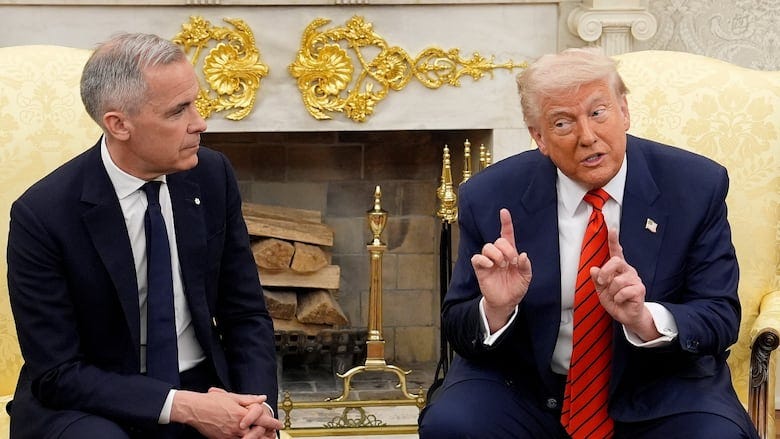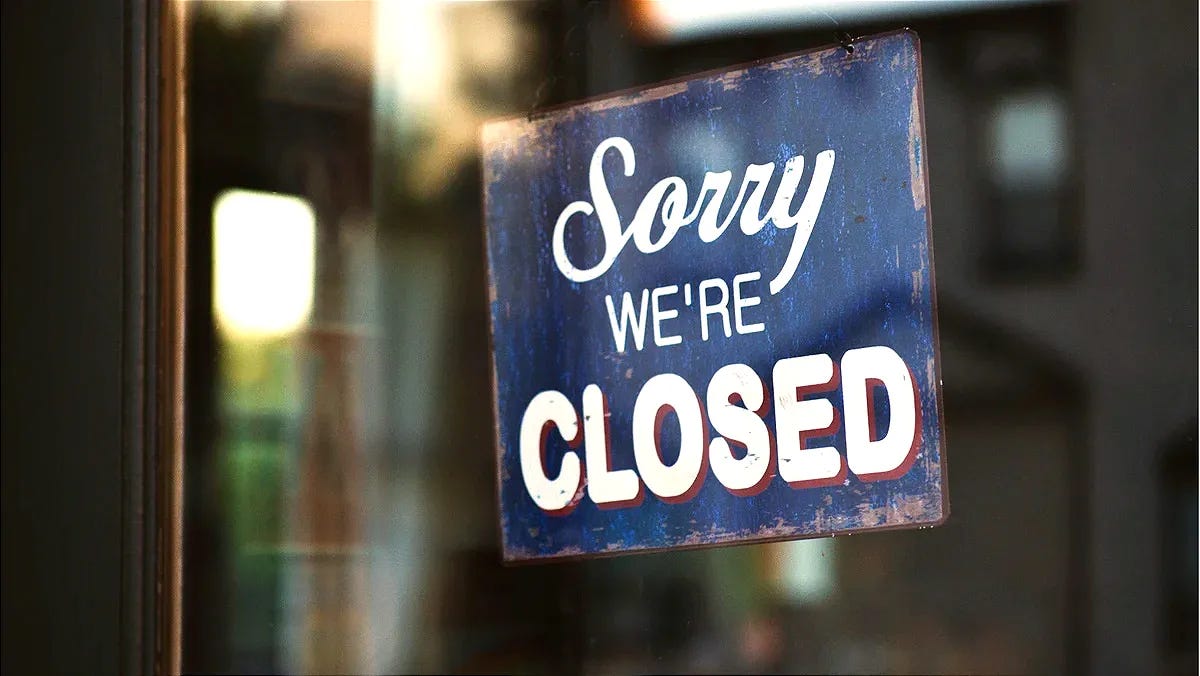Good morning, it’s Friday, August 22nd. In today’s news, How tariffs, layoffs, and high living costs are squeezing Canadians, Citizens are banned from forests while homeless remain exempt, Carney and Trump talk partnership as trade war escalates, Hundreds of thousands of Grok AI chats surface in Google search results after share-link flaw, and much more.
First time reading the daily blend? Sign up here.
A Nation Under Strain: How Tariffs, Layoffs, and High Living Costs Are Squeezing Canadians
Canada’s economy is being squeezed from multiple directions, and the consequences are showing up everywhere—from small business owners to laid-off workers to students struggling to pay rent. Taken together, three new sets of data point to an economy under strain and a public losing confidence in stability.
The Canadian Federation of Independent Business warns that nearly one in five small businesses may be forced to close within six months if current tariff pressures remain. U.S. President Donald Trump’s tariff war and Canada’s countermeasures are driving up costs on everything from inputs to consumer goods. Many businesses have tried to “absorb” these costs to stay competitive, but profit margins are being crushed. Temporary layoffs, price hikes, and uncertainty about the federal government’s willingness to offer targeted relief all point to a sector teetering on the edge.
At the same time, more Canadians are leaning on Employment Insurance. Statistics Canada reports that EI recipients jumped nearly 13 percent year-over-year in June, hitting 541,000 people. The steepest increases were in Quebec and Ontario, where layoffs in sales, service, and manufacturing jobs are concentrated. While manufacturing showed some signs of life in July, the overall job market remains weak, with 41,000 jobs lost nationally that month and unemployment holding at 6.9 percent. The numbers suggest a growing divide—some industries beginning to rebound, while others continue to shed workers in the face of global trade turmoil and domestic uncertainty.
The strain is filtering down to the youngest Canadians too. A new CIBC poll finds nearly half of post-secondary students say they cannot cover their costs without parental or outside support. Soaring rents, food prices, and transportation costs have left students scrambling—78 percent plan to work during the school year, over half will take out loans, and many are cutting back on social activities or moving back home. The summer job market was described as “brutal,” leaving many with little savings to carry into the fall.
Put together, these trends paint a sobering picture: small businesses contemplating closure, workers relying more heavily on EI, and students saddled with debt before their careers even begin. Canada’s cost-of-living crisis is no longer confined to one group—it is spreading across the economic spectrum. Unless policymakers address the root causes, the country risks a prolonged squeeze that could define the years ahead.
Citizens Banned from Forests While Homeless Exempt: Another Lesson in Two-Tiered Justice
Nova Scotia recently imposed sweeping restrictions banning citizens from public and even privately owned forests in response to wildfire risks. This sweeping restriction goes far beyond typical fire-safety measures such as campfire or vehicle bans. In effect, citizens are being denied access to forests on their own property, a move justified by provincial authorities as protecting the “communitarian spirit” and addressing the province’s vulnerability to forest fires.
Yet, the reality on the ground exposes a glaring disconnect. Despite the official restrictions, an estimated 137 homeless campers continue to live in the forests, largely ignoring the rules. Outreach workers visiting them—who also enjoy exemptions from the restrictions—have been unsuccessful. Legal experts point out that ordinary police powers are ineffective in this context—detaining someone for illegal encampment would be unlawful because the offence does not warrant imprisonment. Even the province’s $25,000 fine, theoretically applicable under the fire proclamation, is functionally irrelevant because it applies only to those who could realistically pay it.
This situation mirrors the two-tiered approach Canadians saw during COVID-19 and the BLM protests. During the pandemic, ordinary citizens faced strict restrictions on movement, social gatherings, and economic activity—enforced with fines, policing, and public shaming—while BLM protests, marches, and even riots occurred with little interference. The same pattern emerges in Nova Scotia: the government imposes an extreme forest ban on ordinary citizens, yet allows homeless people to remain in the woods, effectively exempt from the rules. The law exists on paper, but enforcement is selective, creating a clear double standard: ordinary people are constrained and penalized for minor risks, while those actually contributing to fire hazards face no consequences.
While it is frustrating to see two-tiered justice applied, this case highlights a broader lesson for Canadians: government overreach—whether in the form of excessive fire bans, pandemic lockdowns, or other regulatory measures—demands scrutiny and pushback. Citizens should not accept sweeping restrictions at face value, especially when enforcement is selective or ineffective. Indeed, it is both a right and a duty to challenge measures that are disproportionate, arbitrary, or inconsistently applied. Governments can only be trusted to act responsibly when there is active accountability from the populace, and the Nova Scotia fire ban offers a vivid example of why vigilance and civic engagement are necessary.
Carney and Trump Talk Partnership as Trade War Escalates
Prime Minister Mark Carney and U.S. President Donald Trump held their first substantive call on Thursday, with both sides touting the discussion as “productive” and “wide-ranging.” Officially, the conversation focused on building a “new economic and security relationship” between Canada and the United States, as well as long-term peace efforts in Ukraine and Europe. But the reality beneath the diplomatic language is a relationship straining under tariffs, accusations, and clashing priorities.
Since February, the two countries have been locked in a tit-for-tat tariff war. Trump has slapped a 35 percent duty on Canadian imports alongside targeted tariffs on steel, aluminum, copper, and automobiles. Canada retaliated with countermeasures on U.S. goods, including restrictions on American alcohol. According to Washington’s ambassador to Ottawa, these moves prompted Trump’s inner circle to brand Canada “nasty” to deal with.
Yet even as trade tensions intensify, Carney’s government is signalling a willingness to keep dialogue open. That willingness may stem from necessity more than choice. With Canada’s economy increasingly dependent on exports and already showing signs of strain, avoiding a prolonged trade war with its largest partner is crucial. At the same time, Trump continues to accuse Ottawa of being lax on border security, particularly regarding the flow of fentanyl—a charge that has serious political consequences given the opioid crisis devastating U.S. communities.
Meanwhile, Canada’s diplomatic posture abroad looks increasingly contradictory. On the same day as the Carney–Trump call, Foreign Minister Anita Anand met with U.S. Secretary of State Marco Rubio to discuss Ukraine, Haiti, and Gaza. Later, Anand joined 20 other Western and Pacific foreign ministers in condemning Israel for approving new settlement construction in the West Bank—an unusual split with Washington, which remains Israel’s staunchest defender.
All of this underscores Canada’s delicate position: trying to navigate an increasingly protectionist America, a volatile Middle East, and a European war that shows no signs of ending. Carney may emphasize “partnership” and “long-term peace,” but the friction is clear. The reality is that Canada’s most important relationship is already being tested—and neither side is showing signs of backing down. Source.
Hundreds of Thousands of Grok AI Chats Surface in Google After Share-Link Flaw
Over 370,000 Grok (X’s LLM) chatbot conversations accidentally went public after users shared them, letting search engines index everything from harmless chats to dangerous instructions for drugs, malware, assassination, suicide and explosives. The conversations were shared via Grok’s built-in “share” button. When users clicked it, a link was created to their chatbot conversation—but many didn’t realize that doing so made the chats discoverable by search engines like Google and Bing. Essentially, the feature meant “sharing” wasn’t private, and anything linked could be indexed and viewed publicly.
Some of the conversations were clearly tests, but others exposed real gaps in the AI’s safety controls. The leak highlights how easily chatbot interactions can become discoverable, raising privacy and security concerns—and even giving some marketers a way to game search results. It’s a cautionary tale about just how messy AI can get when shared too freely. More
RCMP Arrest Montreal Minor on Terrorism Charges After Pledging Allegiance to ISIS
A Montreal youth has been arrested on terrorism-related charges after allegedly pledging allegiance to the Islamic State and planning attacks on multiple groups of people, the RCMP says. Arrested on August 20 in Côte-des-Neiges–Notre-Dame-de-Grâce, he faces three charges: providing property or services for terrorist purposes, participating in the activity of a terrorist group, and facilitating a terrorist activity. The case underscores growing concerns about online radicalization of minors in Canada, with RCMP and CSIS emphasizing early intervention to prevent youth from mobilizing to commit violence. More
Appeals Court Tosses Trump’s $500 Million Civil Penalty in Business Fraud Case - A judge said the penalty violated the Eighth Amendment’s prohibition on excessive fines. More
Ukrainian Arrested in Italy Over Nord Stream Pipelines Attack - The man, named only as Serhii K. due to German privacy laws, is accused of coordinating the September 2022 attack. More
France Joins Mexico, Spain, Portugal, Italy, Belgium, and Austria as Furious New Overtourism Protest Sweeps Across Borders - More
Trump Administration Vetting 55 Million Foreigners With Valid US Visas for Deportable Violations - More
North Korea Has a Secret Missile Base That Poses a ‘Potential Nuclear Threat’ to the US - The Sinpung-dong missile base is located just 27 kilometres from the China border. It’s believed to store up to nine nuclear-capable intercontinental ballistic missiles (ICBM) as well as their mobile launchers. More
CFIB Warns That 40% of Small Businesses Will Close Within a Year
Canadian small businesses are feeling the squeeze with 40% at risk of closing within a year, according to the Canadian Federation of Independent Businesses (CFIB). Tariffs on steel, aluminum, and retaliatory US duties are driving up costs, disrupting supply chains, and reducing revenue. Nearly 62% of businesses face higher expenses, 48% report lower income, and 36% have paused investments. CFIB warns the uncertainty is forcing companies to constantly adjust plans, with manufacturers and supply chain-linked businesses hit hardest.
Experts also note that these struggles are compounded by how the federal government has been mismanaging the economy, adding layers of regulatory and financial pressure that go beyond tariffs. Meanwhile, Ottawa has collected $29.8 billion from counter-tariffs, with 82% of businesses urging the government to use that revenue for support. More
US Manufacturing Surges to 3-Year High as Demand Strengthens and Hiring Picks Up - More
Meta Puts the Brakes On Its Massive AI Talent Spending Spree - This marks our second warning this week that the AI bubble may be ready to burst. More
Scientists Unlock Protein That Reverses Brain Aging and Memory Decline
Researchers at UC San Francisco have identified FTL1 as a central driver of brain aging. In the hippocampus—the brain’s memory and learning hub—high FTL1 levels were linked to fewer neural connections, slowed cell metabolism, and declining cognition in mice. Boosting FTL1 in young mice aged their brains prematurely, while lowering it in older mice restored branching in neurons, improved hippocampal metabolism, and reversed memory loss. In lab-grown neurons, excess FTL1 caused cells to grow simple, one-armed neurites, whereas reducing it restored healthy branching patterns.
The findings suggest that targeting FTL1 could be a promising path toward therapies to combat age-related cognitive decline, offering new hope for aging brains. More
The Shockingly Simple Vision Breakthrough That Might End LASIK - Using tiny electrical currents and custom contact lenses, researchers reshaped rabbit corneas in just a minute. More
Quartet of Quarterbacks at Career Crossroads in Upcoming Season
Several veteran NFL quarterbacks face make-or-break seasons as they struggle to hold onto starting jobs:
Russell Wilson (Giants): On his fourth team in five seasons, the 36-year-old Super Bowl champ is battling rookie Jaxon Dart for the QB1 spot. Wilson’s uneven preseason outing has New York fans already eyeing the rookie.
Sam Darnold (Seahawks): The 28-year-old is now on his fifth team since 2018. Despite his best season last year, doubts linger about whether he’s turned a corner or just fit a system. Seattle’s gamble on him could backfire if he can’t deliver consistency.
Justin Fields (Jets): Talented but turnover-prone, the 26-year-old is on his third team in four years. With poor preseason numbers and a reputation for running too quickly under pressure, he risks being written off as unrealized potential.
Kirk Cousins (Falcons): At 36, he’s been relegated to a backup role behind Michael Penix Jr. Despite a $27.5 million guaranteed paycheque, Cousins looks more like an expensive insurance policy than a starter.
Together, these four veterans are fighting for relevance as younger arms and proven stars dominate the headlines. More
Wrexham Sign Man City's Callum Doyle in £7.5 Million Transfer - Wrexham, who won three straight promotions under the ownership of Hollywood stars Ryan Reynolds and Rob McElhenney, have started their Championship campaign with back-to-back defeats to Southampton and West Bromwich Albion. More
Golf Today: Headlines From the Fairway
Russell Henley Finished the First Round of the Tour Championship With a Two-Stroke Lead Over Scottie Scheffler - More
Canada's Aphrodite Deng, Just 15 Years of Age, Is Tied for the Clubhouse Lead at the CPKC Women's Open - More
Lil Nas X Hospitalized for Possible Overdose After Roaming LA Streets and Charging at Police - More
A Sweet-Toothed Bear Broke into a California Ice Cream Shop and Ate All the Strawberry Ice Cream
On This Day in 1864, the First Geneva Convention was adopted in Geneva, establishing international humanitarian law "for the Amelioration of the Condition of the Wounded in Armies in the Field." Signed by 12 nations, it laid the foundation for the modern rules of war, ensuring care for the wounded and protections for medical personnel and facilities on the battlefield.



















And stupid people will blame the homeless. Or will insist the homeless are removed so more people can suffer like them.
I'm sure the homeless are abiding by the fire ban and not cooking over open flame.